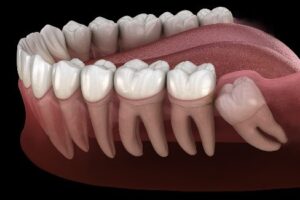- Cedre Shopping Centre | Dubai Healthcare City Center
- drdoaa@theperfectioninsmile.com
DENTAL | EXTRACTION

Reasons A Tooth Needs To Be Removed
When a tooth has suffered significant damage, or is at risk of damaging other teeth or your gums, and can’t be fixed with treatment such as a filling or crown, it may need to be extracted. We try to remove teeth only as a last resort, but depending on the circumstances and extent of the damage, there may be no other option but for a tooth or multiple teeth to be removed.
The removal of wisdom teeth, which are the four teeth furthest back in your mouth – one in each corner – and are the last of your teeth to grow, is a common procedure. Wisdom teeth can cause problems for some people because of the lack of space available in a person’s mouth at the point they break through the gum. This can cause them to emerge at an angle, get stuck and/or impact other teeth, which can cause irritation, pain, swelling and/or infection.
A tooth may also need to be extracted if the center of it, which contains nerves and blood vessels, has a severe infection. This is may be necessary, if antibiotics don’t work, to prevent the spread of infection. Gum disease or to prepare a mouth for orthodontic treatment are two more reasons why a tooth or teeth may need to be extracted.

The Tooth Extraction Procedure
When we extract a tooth, we normally use a local anesthetic, which will numb your mouth. This means you will be awake during the procedure but won’t feel any pain. How long the removal of a tooth takes, depends on the problem with it and how and where it sits in your mouth. It could take 5 minutes or it could take 30 minutes. We will advise on this prior to starting the procedure.
One or more teeth can be removed per appointment. Sometimes it’s advisable to do more than one, sometimes not. We will discuss this with you and you can let us know what you’re most comfortable with. We can replace an extracted tooth or teeth for you. For example, with a dental bridge or dental implant. We will explain the replacement options to you at your appointment.
Extractions – what to expect
Having a tooth out is the same as having an operation and, because of this, you must look after the area to speed healing and to reduce the risk of infection. Here are some pointers:
• For the first 24 hours, try to avoid eating hot food, don’t smoke, don’t drink any alcohol and try not to disturb any blood clot which might have formed.
• Don’t rinse your mouth for 24 hours after extraction. After that, rinse gently with warm salty water – half a teaspoon of salt in a glass of water is enough.
• Brush your teeth as normal to keep your mouth as clean as possible.
• You may feel some small pieces of bone work their way out of the socket – don’t worry, this is perfectly normal.
• There may be some swelling and a bit of discomfort in the first two to three days. If you need to, take some ordinary painkillers – aspirin, ibuprofen or paracetamol will be fine.
• If you feel pain a few days after the tooth has been removed, it might be where the blood clot has broken down leaving an empty hole in the gum. This is called a ‘dry socket’ and will need to be looked at by your dentist.
WhatsApp us

